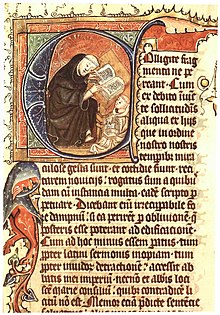Dialogus miraculorum

In Latin wrote Dialogus miraculorum ( dialogue about the miracle , full title Dialogus magnus visionum ac miraculorum ) is a work of Heisterbacher Cistercian monk Caesarius of Heister Bach (1180 - after 1240), in which at Koenigswinter nearby monastery Novice Master and Prior was. The work, written between 1219 and 1223, is written in the form of a dialogue between monk and novice . It consists of twelve books arranged according to spiritual topics, which contain a total of 746 stories.
Written from the perspective of a member of the most influential order of his time, the Dialogus is an extremely important source on the cultural and moral history of the late 12th and early 13th centuries, especially on belief in devils and demons as well as on the ideological internal view of the persecution of heretics and the crusades in many European countries.
Overview of the contents of the twelve books
| Book no. | Latin title | German translation of the title | Number of chapters | Volume and Page Issue Strange |
|---|---|---|---|---|
| Prologus | prolog | I, 1 | ||
| Book I. | De conversione | From entering the monastery | 43 | I, 5 |
| Book II | De contritione | From repentance | 35 | I, 55 |
| Book III | De confessione | From confession | 53 | I, 110 |
| Book IV | De tentatione | From temptation | 103 | I, 171 |
| Book V | De daemonibus | Of demons | 56 | I, 274 |
| Book VI | De simplicitate | From the simplicity | 37 | I, 340 |
| Book VII | De sancte Maria | From St. Mary | 59 | II, 1 |
| Book VIII | De diversis visionibus | Of various visions | 97 | II, 80 |
| Book IX | De corpore Christi | Of the body of Christ | 67 | II, 165 |
| Book X | De miraculis | Of miracles | 72 | II, 217 |
| Book XI | De morientibus | Of the dying | 65 | II, 266 |
| Book XII | De premio mortuorum | From the wages for the dead | 59 | II, 315 |
Manuscripts and prints as well as their abbreviations (according to Strange)
For the edition Caesarii Heisterbacensis monachi Ordinis Cisterciensis Dialogus Miraculorum edited by Joseph Strange , the following codices and prints were used (including the abbreviations used in the Strange edition):
- A Düsseldorf Codex
- B Bonn Codex (1434)
- C Cologne Codex (around 1440)
- D Düsseldorf Codex, Altenberg Monastery
- E [Library Gymnasium Koblenz]
- F [Aachen Library]
- K Editio Koelhoffiana (1481)
- P editio princeps (ca.1475)
- R Editiones recentiores (3 pieces):
- a) Cologne 1591
- b) Cologne 1599
- c) Antwerp 1605
Footnotes
- ↑ 2 vol., Cologne, Brussels 1851, for which an index exists: Index in Caesarii Heisterbacensis Dialogum , Koblenz 1857
- ↑ The manuscript from the possession of the former Cistercian abbey is now in the possession of the University and State Library in Düsseldorf; Signed: Ms. C 27.
German translations
Total translation
- Caesarius von Heisterbach: Dialogus Miraculorum; Dialogue on the Miracles, ed. v. Nikolaus Nösges, Horst Schneider. 5 vols. Turnhout: Brepols, 2009
Partial translations (selection)
Partial translations are from Johannes Hartlieb , Alexander Kaufmann , Ernst Müller-Holm , Otto Hellinghaus and others:
- Johann Hartlieb's translation of the Dialogus miraculorum by Caesarius von Heisterbach, based on the only London manuscript , ed. by Karl Drescher, Berlin 1929 (German texts from the Middle Ages 33)
- Alexander Kaufmann: Wonderful and memorable stories from the works of Caesarius von Heisterbach , selected, translated and explained by Alexander Kaufmann, 2 parts (Annalen des Historisches Verein für den Niederrhein 47, 53), Cologne 1888, 1891
- Caesarius von Heisterbach. German by Ernst Müller-Holm. Berlin: Karl Schnabel Verlag 1910 (Lost Masters of Literature III.)
- Otto Hellinghaus: One hundred exquisite, wonderful and strange stories by the Cistercian Caesarius von Heisterbach († around 1240), Aachen: Deutschherren Verlag, 1925
Web links
- Literature on the Dialogus miraculorum in the Opac of the Regesta Imperii
- Historical sources of the German Middle Ages (Caesarius prior Heisterbacensis monasterii) extensive literature references (PDF file; 2.17 MB)
- Brief description of the manuscripts with the call numbers C 26 and C 27 in the manuscript collection of the University and State Library of Düsseldorf (PDF file; 460 kB)
- Caesarius Heisterbacensis: Dialogus miraculorum , Cologne approx. 1473 ( digitized version ).
- Caesarius Heisterbacensis: Dialogus miraculorum , Johann Koelhoff d. Ä. , Cologne 1481 ( digitized version )
- Caesarius Heisterbacensis: Dialogus miraculorum , northern Rhineland, Altenberg, Cistercian Abbey, 14th century, 2nd third ( digitized version )
- Caesarii Heisterbacensis: Dialogus miraculorum , ed. by Joseph Strange, Cologne 1851, ( digitized version )